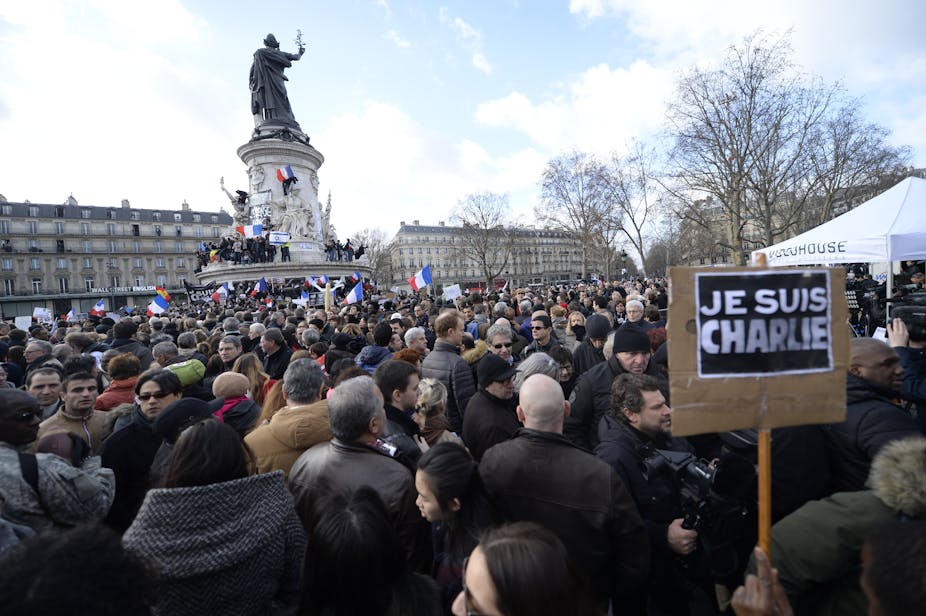On Sunday, millions of people turned out to reaffirm the unity of France in the wake of the Charlie Hebdo attack.
About 1.5 million people came to the march in Paris. For two hours before the march started, all of the streets leading to the Place de la Republique were crowded with streams of people, all headed the same way. The mood was uniformly peaceful. Thousands of people carried “Je suis Charlie” (I am Charlie) or “Nous sommes tout Charlie” (We are all Charlie) signs. Some carried large models of pencils or pens. The crowd included many thousands of Muslims.
The crowd applauded as foreign dignitaries such as German Chancellor Angela Merkel and Israeli Prime Minister Benjamin Netanyahu arrived. French President Francois Hollande walked into the crowd and embraced employees of Charlie Hebdo.
There was no trace of tension or bitterness; no sense of recrimination. The wrongdoers were dead; the rest of the Muslim community was not to blame and was not to be made to feel the blame.
There were no speeches, no calls for revenge, no attempts to analyse or explain. There was a remarkable sense that the crowd and the politicians were one. This was the more striking given the controversial nature of some of the leaders who attended. Significantly, Front National leader Marine Le Pen was not there and did not add her own views – even from a distance.
Uniformly, the spirit was one of unity. On Monday morning, French newspaper Le Figaro carried headlines which read:
A Paris, une maree humaine exalte la cohesion nationale (In Paris, a human tide exalts national cohesion)
Hollande réunit gauche et droite pour la République (Hollande unites left and right for the Republic)
Those headlines fairly captured the spirit of the occasion. Earlier on Monday, Merkel thanked leaders of Germany’s Muslim community for condemning violence committed ostensibly in the name of Islam.
One of the victims of the Charlie Hebdo attack was a policeman, Ahmed Merabet, killed in cold blood as he lay wounded on the pavement. He was a Muslim. Eight of the victims were on the staff at Charlie Hebdo. They were certainly not Muslims. Presumably they were secular.
In a related event, hostages were taken in a Kosher supermarket. Several Jewish employees were shot in cold blood.
Muslim extremists carried out both attacks. Both attacks were undoubtedly acts of terrorism: criminal offences committed in pursuit of ideological objectives.
But the whole of last week in Paris is rich with ambiguity. Charlie Hebdo is famous (notorious, perhaps) for publishing cartoons that are deeply offensive to Muslims: they take free speech to the limits. But however offensive the cartoons, they do not justify mass slaughter.

Since the attack, one main theme has been the importance of maintaining free speech. Another has been to distinguish between the killers, who were Muslim extremists, and Muslims generally. This is a lesson we have yet to deal with in Australia. Some Muslims are extremists who defile their faith by committing atrocities in its name.
Most Muslims are not extremists and are appalled at such events. A survey of the past century throws up plenty of examples of extremists of various religions whose criminal conduct does not in truth reflect the teachings of their faith.
It would have been very easy for Hollande to exploit these events politically by condemning Muslims, urging a tightening up of security laws and so on. After all, when the people feel they are under attack, it is easy to persuade them to sacrifice some of their liberty for the benefit of a little more security.
Instead, Hollande acted with the specific objective of bringing the nation together. In this, his response is very different to what we have come to expect in Australia.
The Martin Place siege was curiously instructive in this regard. It was a terrible event, without doubt. Not a terrorist act, but a terrible criminal act by a crazed person with some kind of religious delusion.
Australian Prime Minister Tony Abbott acknowledged that the siege-taker, Man Haron Monis, had a long history of criminal offences. He referred to the siege as a “brush with terrorism” but stopped short of saying it was a terrorist act. He also stopped short of urging people not to blame the Muslim community for it.
Islamophobia is clearly present in Australia. In the wake of September 11, anti-Islamic sentiment became florid. It remains still, festering just below the surface, but within easy reach of politicians looking for cheap advantage. It is an available explanation for our hostility to boat people; it is a common feature of each of Australia’s military engagements in the past 14 years.
Terrorist acts, and things capable of being seen as terrorist acts, provide fertile ground for those who would foster division in our society. Since 2001, anti-Islamic dog-whistling has disfigured Australian politics. We have not seen any political response as clear and unifying as the march in Paris on Sunday.
It was a good example of political leadership: something that has been absent from Australian politics for several decades.

